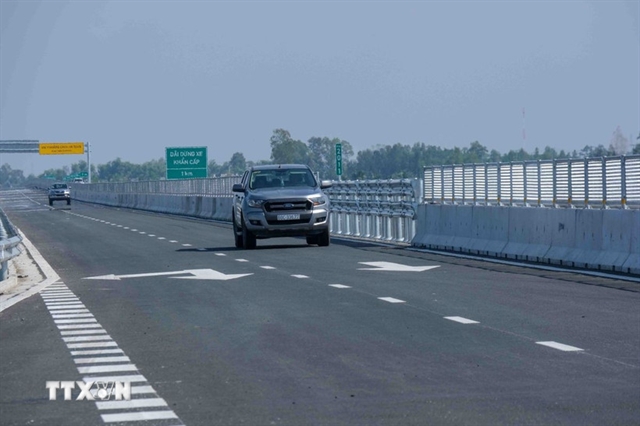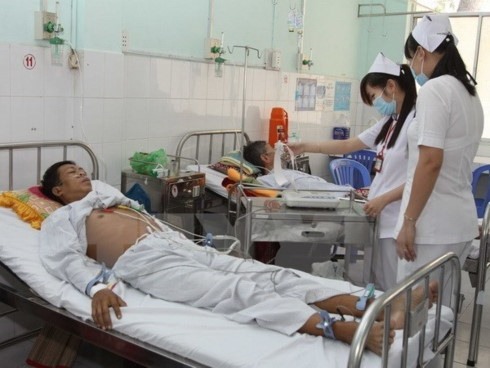 Society
Society

" />Many doctors in the Cửu Long (Mekong) Delta are reportedly quitting their jobs at public hospitals to seek opportunities at private hospitals due to low salaries, pressure in the workplace, and a shortage of favourable policies.
 |
| Patients receive treatment at Cần Thơ General Hospital. — VNA/VNS Photo Mạnh Linh |
HCM CITY — Many doctors at public hospitals in the Cửu Long (Mekong) Delta are reportedly quitting their jobs to seek opportunities at private hospitals due to low salaries, pressure in the workplace, and a shortage of favourable policies.
The worst-affected localities are Cần Thơ City and provinces such as Hậu Giang, Long An, Vĩnh Long and Cà Mau that have seen an strongly increase in the number of well-qualified and experienced doctors at public hospitals shifting to private workplaces.
Văn Công Minh, deputy director of Vĩnh Long Province’s Department of Health, said that last year, up to seven doctors, most of them with post-graduate training, had resigned from Vĩnh Long Province’s General Hospital.
In the first four months of this year, six doctors quit and more than 10 doctors resigned in the province. Most of the doctors cited personal family circumstance, he said.
Minh said the main reason, however, was dissatisfaction with their monthly income, which they said had not reflected their real contributions.
At Cần Thơ General Hospital, 33 doctors have resigned, including 14 doctors in 2016, 14 in 2017, and five in the first five months of this year.
Huỳnh Văn Nhanh, deputy director of Cần Thơ Province’s Health Department, said that some employees had quit for the simple reason of pay because private hospitals had offered them significantly higher salaries.
The situation has been the same in Hậu Giang Province, a more remote area in the Mekong Delta.
Phan Thanh Tùng, deputy director of Hậu Giang Province’s Department of Health, said that 19 experienced doctors had left their job since 2016 because of low incomes and poor working conditions.
Since 2015, in Cà Mau Province, 105 health workers, including 98 doctors and eight pharmacists, have left their jobs at public hospitals, according to the province’s Department of Health.
Many of the doctors have post-graduate degrees with years of experience and had worked at Cà Mau Province’s General Hospital and Cái Nước District’s General Hospital.
Nguyễn Hoàng Vũ, chief secretariate of Cà Mau Province’s Health Department, said that public hospital doctors faced low salaries as well as workplace pressure.
A doctor who declined to be named said that a number of well-qualified and experienced doctors quit their jobs in order to be better paid and work in a more transparent business environment.
Solutions
Trần Minh Thiết, director of Năm Căn District’s General Hospital in Cà Mau, said: “Public hospitals pay wages according to rank and level. For example, new doctors each gets only VNĐ3-4 million (US$130-175) per month, which will increase as they become more senior.”
Meanwhile, the wage at private hospitals for skilled doctors could be dozens of millions of Vietnamese đồng per month, he said.
Most doctors sent abroad for post-graduate degrees decided to work for private hospitals after they complete their studies.
Dr Bùi Đức Văn, director of Cà Mau Province’s General Hospital, said many public hospitals had no choice but to pay low wages to doctors because of financial restraints. When public hospitals become financially independent in the near future, the salary of doctors are expected to increase.
Huỳnh Minh Phú, head of the administration department of Cần Thơ General Hospital, said the hospital would recruit new doctors who will receive 100 per cent salary instead of 85 per cent during their apprenticeship period.
The hospital will also offer specialised training to improve their professional skills.
In the long run, the hospital is expected to have financial autonomy and will improve high-tech services to generate more revenue and increase staff income, according to Phú.
Phan Thanh Tùng, deputy director of Hậu Giang Department of Health, said it was necessary to reform the current salary policy and provide better medical equipment to improve living standards and working conditions for doctors.
Nguyễn Huy Quang, head of the Ministry of Health’s Legal Services Department, said that doctors’ shift from public to private hospitals was easy to understand. Many have to work at medical facilities with crowded patients, and they also face a high risk of medical errors.
Quang said it was time that public hospitals implemented policies to retain talented people and promote training courses for a higher quality workforce.
Mekong Delta, which consists of Cần Thơ City and 12 provinces, has 123 general hospitals and 37 specialist hospitals.
But all of these facilities lack qualified doctors and other trained personnel, according to figures from the Ministry of Health. — VNS




